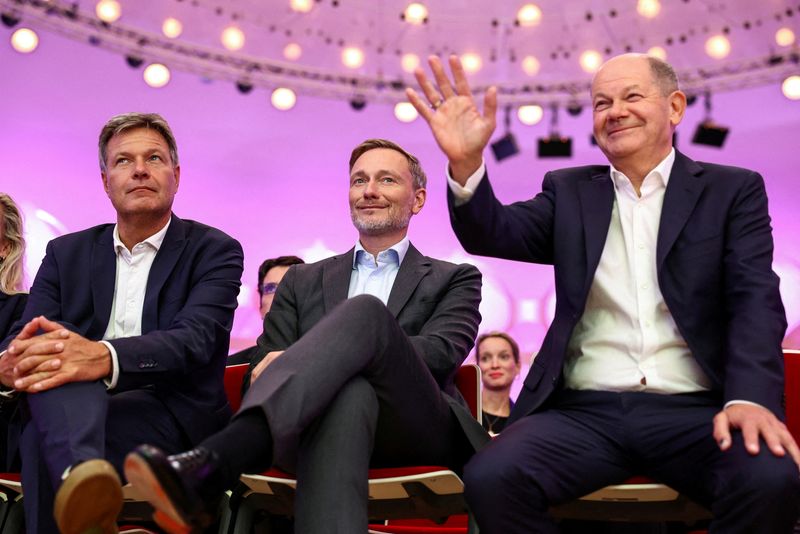Analysis-Risk of German coalition breaking up rises, fate hinges on FDP liberals
2024.10.29 02:32
By Andreas Rinke, Christian Kraemer and Sarah Marsh
BERLIN (Reuters) – Chancellor Olaf Scholz announced this month a summit of industry leaders to discuss how to save Germany’s flailing economy.
A week later Germany’s economy minister laid out his own proposals. Then the finance minister announced another business summit to take place on Tuesday – the same day as Scholz’s.
None of the announcements were coordinated with one another, or met with reciprocal approval, in a cacophony underscoring the escalating dysfunction within Germany’s ideologically disparate coalition of centre-left Social Democrats (SPD), free market Free Democrats (FDP) and Greens.
The campaign for next year’s federal election appears to have unofficially started already, pitting the three parties in Scholz’s coalition against one another, say senior party and government officials. The risk of it falling apart is higher than ever before.
Panic within the parties over dismal performances in recent regional elections which saw the FDP and Greens drop out of some state parliaments is causing them to pile pressure on their leaders to compromise less and push their own agendas better.
The FDP in particular, which is currently polling nationally under the 5% threshold needed to enter the federal parliament, is a flight risk. The party has for weeks been debating whether it has a better chance of improving its ratings in or outside the government, senior FDP sources told Reuters.
FDP leader and Finance Minister Christian Lindner is not keen on blowing up the coalition but faces increasing pressure within his party, said one government official who declined to be named. “Everything hinges on Lindner.”
Until recently, the poor ratings of all three coalition parties were seen by analysts as too great a disincentive for them to seek new elections. They would also fear being punished for abdicating responsibility, particularly with wars raging in Europe and in the Middle East.
But the FDP could hope to win votes for ending an increasingly unloved, ineffective coalition, said Stefan Marschall, political scientist at the University of Duesseldorf.
DECISION TIME
Lindner has called this the “autumn of decisions”, saying the government must agree important measures to boost the economy and to close the budgetary gap.
“Stability for Germany is of paramount importance,” Lindner told the outlet Table Briefings this month. “But at some point, a government itself can be part of the problem.”
No longer pulling his punches, Lindner called the policy proposals that Economy Minister Robert Habeck of the Greens announced last week to foster investment through tax relief a “sign of conceptual helplessness”.
“Will the stalemate in the coalition now be followed by an open exchange of blows? Should this go on for another year?” asked Friedrich Merz, leader of the main opposition Christian Democrats (CDU), which is calling for snap elections.
Scholz has rejected that call, saying: “When someone has a mandate, they must work to fulfil their duties.”
The FDP was always the odd one out in Scholz’s unwieldy coalition which nonetheless united in its early years over an external threat: Russia’s invasion of Ukraine and the subsequent energy crisis.
Now, though, the focus has shifted to reviving an economy that is set to contract for the second year in a row, bringing the differences between the fiscally hawkish FDP and more spendthrift SPD and Greens to the forefront.
Whether or not they can get the 2025 budget passed in parliament will be a litmus test for the coalition’s viability, said one high-ranking FDP source. The budgetary committee meets on Nov. 14.
“Before that decisive meeting, the government needs to come up with a common understanding, also in light of the recent tax estimates, on the next steps in economic and financial policy,” the source said. “The next weeks will be decisive.”
The projected shortfall in Germany’s draft 2025 budget widened to 13.5 billion euros ($14.58 billion) from 12 billion euros as a result of those estimates, Lindner said last week.
‘NO TRUST’
An FDP government official said a third round of negotiations between Scholz, Habeck and Lindner would likely be needed.
“The mood is not good at all, there is no trust anymore,” the official said.
The most likely scenario is still that the coalition holds together until the next federal election on Sept. 28 given hope that its policies might start yielding fruit and the German proclivity for stability, analysts and officials say.
However, the SPD’s new general secretary, Matthias Miersch, this month raised the possibility of a minority government if the FDP or the Greens were to exit the coalition early.
“If the budget has been approved ahead of time that wouldn’t be a problem,” he said.
Given the government’s lack of popularity, however, it would likely struggle to resist pressure for new elections. Such a move would require the chancellor to first call a vote of no confidence so the president could then dissolve parliament.

One particular external event could yet cause the coalition to rally together, namely the potential re-election on Nov. 5 of former U.S. president Donald Trump, who has threatened to impose high tariffs on imports and condition support for NATO allies.
“The world’s third largest economy could not risk being without leadership at such a time,” the first government official said. “Everyone knows that, even Lindner.”








